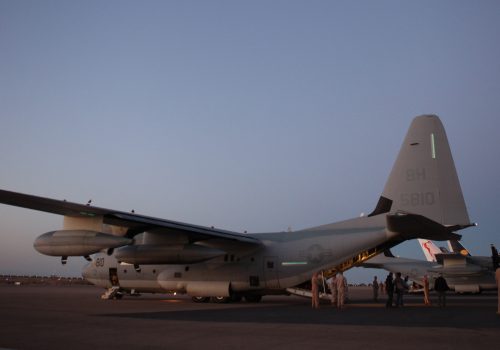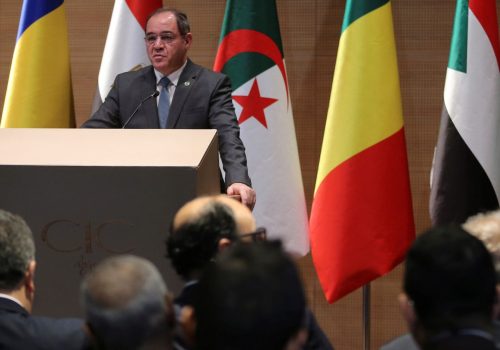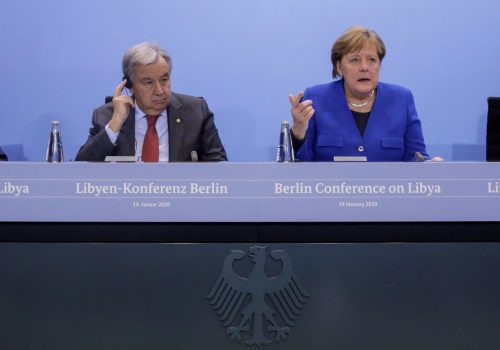The Cairo Declaration is a false resolution to Libya’s conflict
Days before United Nations-sponsored peace talks between the competing sides in Libya’s conflict—which were scheduled to take place in the Libyan city of Ghadames—the situation in the country returned to a critical point. Thanks to the military support of his regional sponsors—Egypt, the UAE, and Saudi Arabia—and the international community’s general silence, on April 4, 2019, General Khalifa Haftar, head of the so-called Libyan Arab Armed Forces (LAAF), began a military campaign to wrest control of Tripoli, the seat of the UN-backed Government of National Accord (GNA). The general’s intention was to overtake the capital in a short time. However, the reality on the ground immediately proved otherwise and the siege soon turned into a fourteen-month war of attrition.
During this period, several diplomatic meetings failed to force the GNA and the Haftar faction into a permanent ceasefire, prompting negotiators to focus on limiting the interference of regional powers, who continued to supply the various factions with mercenaries, drones, and ground-to-air defense with impunity. This violated the UN Security Council (UNSC)-imposed arms embargo, known as resolution 1970. Moreover, despite his official participation in these international meetings, Haftar always maintained his firm intention to conquer Tripoli and take control of the country without compromising with anyone, as he was assured by the logistical and military support provided by Egypt, the UAE, and, ultimately, Russia, who began to deploy mercenaries through the Wagner Group.
The effect of international involvement was worsened by Haftar’s rhetoric, which justified his quest for power by claiming that he would eradicate radical Islam from Libya. This rhetoric was shared and bolstered by Egypt and by most of the Arab Gulf monarchies concerned with the threat of any Islamist activism, especially, the Muslim Brotherhood. In December 2019, despite the GNA’s strong resistance, the LAAF seemed very close to carrying out the “final assault” on Tripoli. The situation on the ground reversed only due to the effective military intervention of Turkey. By the end of May of this year, the forces aligned with the GNA, aided by Turkish air support and by foreign militias—mainly injected from the Syrian battleground—launched a counteroffensive that is currently defeating Haftar’s forces, forcing them to retreat to pre-April 2019’s lines.
This situation has strained the general’s supporters, who fear losing their grip on Libya’s East and their interests in the country. They are, now, trying to resume the diplomatic path by demanding a ceasefire. On June 6, Egyptian President Abdel Fattah al-Sisi, for whom the Libyan crisis is closely linked to his country’s domestic stability and his own political legitimacy, announced a new joint political initiative in a press conference in Cairo that aimed to end the conflict in Libya. The so-called “Cairo Declaration,” backed by Haftar and Libya’s parliamentary speaker Aguila Saleh, proposes an intra-Libyan resolution as a basis for resolving the country’s conflict, a presidential council election to be held under UN auspices, and the drafting of a constitutional declaration to regulate elections for a later stage. The declaration was quickly welcomed by Arab states, such as Saudi Arabia, the UAE, Jordan, and Bahrain, who each voiced their support for an end to the ongoing disputes in Libya. They asserted the need to defend Arab national security and its interests in a sort of rhetorical Pan-Arab stance.
But behind the firm desire to enforce the Libyan people’s goals of stability and development and preserve the country’s sovereignty, as Sisi stated, the Cairo initiative reveals the real intention of the East-based bloc. This declaration, in addition to establishing a general 48-hour ceasefire and the resumption of the 5+5 Libyan Joint Military Commission under the auspices of the UN, requires the militias to disband and hand over their weapons to the LAAF—considered Libya’s only security provider by the plan’s author. Furthermore, it calls for the expulsion of foreign mercenaries from the country, referring only to those that are helping the GNA’s military effort and not to the many Sudanese mercenaries fighting for Haftar.
Cairo’s decision raises many doubts, as this initiative is, basically, a copy of previous mediation agreements that ended in failure and Cairo is, now, seeking the UN’s protection after having ignored it for a long time. Moreover, this declaration would not just annul fourteen months of war, but would leave unresolved all those controversial points that derailed every previous diplomatic attempt. Additionally, Haftar and Sisi have seemed to maintain their aggressive rhetoric, condemning Turkish intervention as a threat to the country and the entire region and accusing Ankara of sponsoring terrorism.
The GNA should not accept the terms of this negotiation. Instead, it should express its willingness to negotiate under different terms and conditions that protect some binding principles—the most important of which is justice. Haftar’s army has committed innumerable human rights violations and crimes against the civilian population, especially, in targeting first responders and hospitals. According to estimates, more than 350,000 people remain internally displaced and hundreds of civilians have been killed since Haftar’s April 2019 attack. Only strong respect for justice and accountability will make it possible for successful negotiations to lead to a national reconciliation path. Tripoli should ask Haftar to step down as principal negotiator to facilitate a possible peace agreement. Furthermore, serious security sector reform could not be based on the LAAF, which represents the classic risk of “double loyalty” that could lead to a dangerous bipolar attitude, reactivating sectarianism and possible infighting. The government should consider the need to create an official military power that operates under civilian control and within an institutional framework, as the Libyan Shield and the Supreme Security Committee project of 2013 tried to do.
On the other hand, the international community should be aware of the trap in calling for international support of the Cairo Declaration and should not accept any proposal just for the urgency of restarting the negotiation process. Again, the only way to de-escalate the conflict and reassert the sovereignty of Libya—without the interference of external regional players—is to return to a UN-proposed solution supported by non-aligned states, whose role has to be strengthened through recognized international norms.
Karim Mezran is a resident senior fellow at the Atlantic Council’s Rafik Hariri Center for the Middle East. Follow him on Twitter: @mezrank.
Alessia Melcangi is a nonresident senior fellow at the Atlantic Council’s Rafik Hariri Center for the Middle East and a tenure track assistant professor at La Sapienza University of Rome. Follow her on Twitter: @AlessiaMelcangi.
Image: Libyan military commander Khalifa Haftar meets with Egyptian President Abdel Fattah al-Sisi at the Presidential Palace in Cairo, Egypt April 14, 2019 in this handout picture courtesy of the Egyptian Presidency. The Egyptian Presidency/Handout via REUTERS


